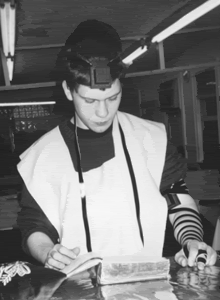We are about to celebrate Shavu'ot, and many of us will stay up all night learning Torah. Tomorrow we will hear the Ten Commandments in shul, and refer to the holiday in the
Amida as "
z'man mattan torateinu" - the time of the giving of the Torah. But if we look in the
Torah shebikhtav, there is no mention of Shavu'ot as commemorating the giving of the Torah. Torah was supposed to be as fresh and new every day as the day it was given. And indeed, Shavu'ot is the only holiday that does not have a fixed date on the calendar. It is celebrated seven weeks after the second day of Pesah. Before the adoption of a fixed calendar in the fourth century C.E., each month had either 29 or 30 days depending on when witnesses saw the new moon in Jerusalem; one never knew in advance how many days a month would have. Depending on whether Nisan and Iyar had 29 or 30 days, Shavu'ot could come on the fifth, sixth or seventh of Sivan. The seventh is the day of Mattan Torah only according to R. Yosi, and the fifth is not the day according to anybody!
The holiday is charcacterized in
Torah shebikhtav two ways:
Shavu'ot, since it occurs seven weeks after Pesah, and
Yom Ha-bikkurim, the day when the first of the wheat crop was brought up to the
Beit Ha-mikdash and given to the Kohanim. The
Mattan Torah angle apparently is post-exilic, a cultural accretion that developed when we no longer had a
Beit Mikdash and therefore could not bring
Bikkurim.
Shavu'ot is also referred to in the Mishna is
Atzeret, a conclusion. Just as
Sh'mini Atzeret is the conclusion of
Sukkot, Shavu'ot is a conclusion of Pesah. We've all heard, and most of us will hear again tomorrow or the day after,
drashot explaining that the purpose of
yetzi'at Mitzraim was fulfilled with
Mattan Torah seven weeks later. Freedom without law is not freedom but chaos. Without detracting from this explanation, I would like to offer an additional one. As slaves our lives were not our own; we did what our masters told us to do when they told us to do it. Even our food was dictated by our masters, who set a pot of food in front of us the way one would feed animals (see the commentaries on
sir ha-basar, the fleshpots of Egypt). The fruits of our labor belonged not to us but to our oppressors. As free men, our lives would be very different. We would have our own country, work its soil, and enjoy its produce. The temptation to attribute our success to our own efforts -
kohi v'otzem yadi (see
Parshat Eikev) must have been strong. Therefore, we were commanded to take the first fruits of each year's crop, bring it up to the
Beit Ha-mikdash, and recite a confession which became the basis of the
Haggadah Shel Pesah [see the beginning of
Parshat Ki-Tavo]. But the
Haggadah stops in the middle, after the miraculous deliverance from Egypt. The remaining verses are not read at the
Seder: And He brought us to this place, and He gave us this land flowing with milk and honey. And now I brought the first fruits of the land that You, Hashem, gave me, and he [the one who brings the
Bikkurim] shall leave it before Hashem your God and He shall bow down to Hashem your God. And he shall rejoice in all the good that Hashem your God gave you and your house. . . . Shavu'ot becomes the conclusion of Pesah, in that
we confim our freedom by thanking Hashem for the privilege of working our soil and eating its produce, and acknowledge that our material success comes from Hashem! Is this the same people that developed a culture of parasitism where working for a living is denigrated and the ideal is to study Torah full time and live off the labor of others? If I had my druthers we would be reading
Parshat Ha-bikkurim on
Shavu'ot along with the Ten Commandments.
The
Bikkurim were to be brought up in a basket, in Hebrew not the usual
sal (as in
kadursal, basketball), but a
tene, a word that sounds Egyptian. A
tene held things. It resembles a Latin root meaning "to hold," i.e.
tenir in French. In English the word "tennis" originates from the racket that a tennis player
holds in his hand, and Cold War defeatists told us that West Berlin was un
tenable, we couldn't hold onto it. I wonder if the Hebrew-Egyptian and Latin words are related, or if they simply resemble each other by accident. At any rate, in a good year the contents of a
tene must have been heavy, and it had to be
held in the hand at least the final few hundred meters to the
Beit Ha-mikdash.
Shavu'ot - Yom Ha-bikkurim was no holiday for Jewish weaklings!
Let us pray that we will soon celebrate
Shavu'ot as we were commanded, as normal Jews in a normal country once did, with heavy baskets carried on strong Jewish shoulders to the rebuilt
Beit Ha-mikdash, quickly and in our time.
Labels: basketball, Israel, Jerusalem, Pesah, Shavu'ot, strength, Tanakh, Zionism




